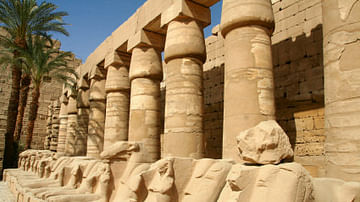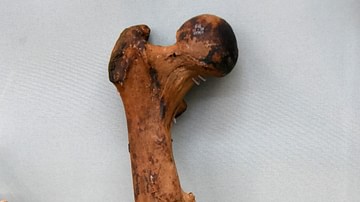Search
Did you mean: Egyptian Empire?
Search Results

Definition
Ancient Egyptian Mythology
Egyptian mythology was the belief structure and underlying form of ancient Egyptian culture from at least c. 4000 BCE (as evidenced by burial practices and tomb paintings) to 30 BCE with the death of Cleopatra VII, the last ruler of the Ptolemaic...

Article
Rome's Egyptian Heritage
The Eternal City of Rome is one of the places in the world with the most historical sites to visit. The list of ancient ruins, museums, churches, and other historical landmarks makes the city an Eldorado for anyone interested in history...

Article
The Egyptian Cinderella Story Debunked
The story of Cinderella is one of the most popular in the world. In the west, it has enjoyed a continuous following since its revision and publication by Charles Perrault in 1697 CE but the tale of the young heroine, unjustly forced into...

Definition
Karnak
Karnak is the modern-day name for the ancient site of the Temple of Amun at Thebes, Egypt. The Egyptians called the site Nesut-Towi, "Throne of the Two Lands", Ipet-Iset, "The Finest of Seats" as well as Ipt-Swt, "Selected Spot" also given...

Interview
Interview: Egyptian Mythology by Garry Shaw
World History Encyclopedia is joined by Egyptologist and author Garry Shaw to chat about his new book Egyptian Mythology: A Traveller's Guide from Aswan to Alexandria. Kelly (WHE): Do you want to start with telling us what the book is about...

Definition
Ra (Egyptian God)
Ra (also given as Re) is the sun god of ancient Egypt. He is one of the oldest deities in the Egyptian pantheon and was later merged with others such as Horus, becoming Ra-Horakhty (the morning sun), Amun (as noonday sun), and Atum (the evening...

Article
Ancient Egyptian Medicine: Study & Practice
In Europe, in the 19th century CE, an interesting device began appearing in graveyards and cemeteries: the mortsafe. This was an iron cage erected over a grave to keep the body of the deceased safe from 'resurrectionists' - better known as...

Definition
Ancient Egyptian Vizier
The vizier in ancient Egypt was the most powerful position after that of king. Known as the djat, tjat, or tjati in ancient Egyptian, a vizier was the equivalent of the modern-day prime minister of the nation who actually saw to the day-to-day...

Definition
Egyptian Papyrus
Papyrus is a plant (cyperus papyrus) which once grew in abundance, primarily in the wilds of the Egyptian Delta but also elsewhere in the Nile River Valley, but is now quite rare. Papyrus buds opened from a horizontal root growing in shallow...

Article
The Egyptian Amulet: Pious Symbols of Spiritual Life
Material Objects & Cultures Material objects convey volumes about the people who possessed them. Cultures and societies in every generation are in part classified - either correctly or incorrectly - by the objects or symbols they select...